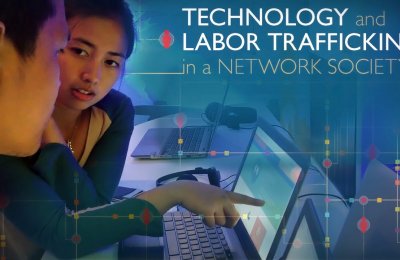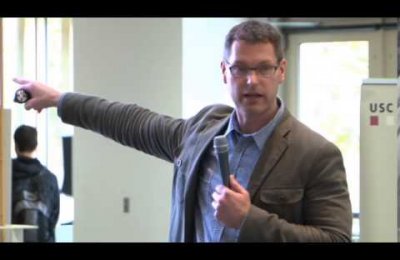By Laura Nelson
Student Writer
An investigative journalist and a social media expert were two of the many highlights at USC Annenberg's Trojan Parents Weekend events Friday, where the discussions ranged from political scandals and death threats to Facebook, job applications and Internet piracy.
Activities and events included a breakfast with Dean Ernest J. Wilson III (photos), a discussion with investigative broadcast journalists in the Republic of China (photos), a presentation on the “digital generation” by Provost’s Professor of Communication, Journalism and Cinematic Arts Henry Jenkins (photos), and an open house that showcased multiple programs and extra-curricular activities at USC Annenberg (photos).
Shining a Light on Corruption: The Story of Two Journalists in the Republic of China
Tao Lee (pi
Lee's 103-year-old father, who was in the audience, heard for the first time the danger his son was in during his attempt to expose the financial corruption of then-Taiwanese President Chen Shui-bian. The event was co-hosted by USC Visions and Voices.
"You have to continue to investigate the story, no matter what would come out because of it," said Lee, who added that he was afraid for his life during the investigation. "No matter what happened, even if we walked into a thunderstorm, it's our obligation to expose the truth."
As a talk show host on Taiwanese cable station TVBS, Lee investigated the finances of President Chen. Lee's persistence kicked off an investigation that uncovered more than $3.15 million embezzled and more than $9 million in bribes.
Chen and his wife, Wu Shu-chen, were both sentenced to life in prison. Chen's sentence was reduced to 20 years this June after a Taipei court ruled there was insufficient evidence that he embezzled $300,000 in government funds.
There was a period when TVBS thought they would be shut down, Lee said. In late 2002, he aired photos of a top government official at a casino in South Korea, shortly after Chen swore none of his top aides had ever gambled. The day after the photos aired, the government began investigating TVBS's ownership structure. President Chen later backed down.
Lee emphasized that standing strong against those pressures comes from the importance of having freedom of the press in a democratic society, along with a community of peace-loving people, media owners who understand the importance of good journalism and the support of a loving family.
Lee said his first inspiration to become a journalist came when he was very young and read about Bob Woodward and Carl Bernstein's Watergate coverage.
"I dreamed maybe someday I would have the same courage to do the same thing for justice in my country," Lee said.
For additional resources on this event, please refer to the "Libguide" research guide, produced by USC Libraries.
Raising the Digital Generation: What we Know about Digital Media and Learning

Older people may feel like "digital immigrants" in the world their children have grown up knowing, said Henry Jenkins (pictured, left), the USC Provost's Professor of Communication, Journalism and Cinematic Arts. But that shouldn't stop parents from having responsible, open conversations with their children about social media and the Internet.
"The digital world needs to be part of the overall process of raising a kid," Jenkins said. "Parents and school should both discuss it, because it has educational value and because it can be dangerous."
Great innovation and friendship can come out of social media, Jenkins said. He cited the collaborative energy of Wikipedia, the support of online communities and the editing-writing partnerships formed on fan-fiction sites.
But the participatory culture of social media also raises issues such as identity crises, Internet piracy and job-ruining Facebook profiles.
"Political candidates are being hit right now with things they said on TV 10 years ago," Jenkins said. "Twenty years from now, it'll be what they said on Facebook and what they said on YouTube."
That's why parents need to step in, Jenkins said. Kids resent parents who stalk them online, but need someone to give realistic advice. He recommended parents be aware of what their kids are doing online, but give them the freedom to navigate the digital world on their own.
"Parents are sometimes saying, 'Make stuff up about yourself – don't tell the truth online,'" Jenkins said. "Don't do that. That sends mixed messages to kids about honesty and when it's OK to lie."
He compared parents in the digital age to Spiderman's Aunt May, who looked after Peter Parker as he grew into a superhero.
"It's not easy to be Aunt May, to try to take care of the budding superhero," Jenkins said. "But we should strive to raise children who are authors, rather than victims, of culture."
Breakfast with the Dean Photos
Shining a Light on Corruption Photos
Raising the Digital Generation (Henry Jenkins) Photos
Annenberg Open House Photos








